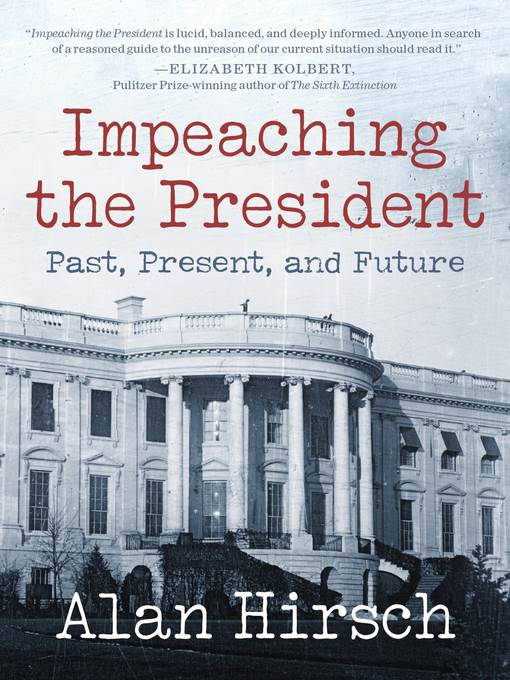
Impeaching the President
Past, Present, and Future
کتاب های مرتبط
- اطلاعات
- نقد و بررسی
- دیدگاه کاربران
نقد و بررسی

September 1, 2018
Amid the partisan passion, an illuminating primer of analysis and context lowers the temperature on this hot-button issue.By the end of this volume, readers may still disagree on whether the current president should be impeached, but the debate will be better informed by an understanding of precedent and Constitutional conditions. "Like any potent tool, impeachment is dangerous if misused," writes Hirsch (Chair, Justice and Law Studies/Williams Coll.; The Duke of Wellington, Kidnapped!: The Incredible True Story of the Art Heist that Shocked a Nation, 2016, etc.), who proceeds to explore both its dangers and misuse. He strongly suggests that it was misused in the case of the two actual impeachments, those of Andrew Johnson and Bill Clinton, both of whom faced charges brought by the House that were largely partisan in nature and fell short of the "bribery, treason, or high crimes and misdemeanors" that the Constitution stipulates. The author also distinguishes between the largely political charges levied against Johnson and the moral and legal transgressions Clinton faced as an accused perjurer and obstructer of justice. Richard Nixon, on the other hand, met the impeachment criteria as delineated here, though he resigned rather than face it. Yet Nixon's threatened impeachment had the opposite impact as Johnson's actual one, as if impeachment "had been normalized by Watergate. Whereas the Andrew Johnson fiasco led to avoidance of impeachment for the next century, the successful pursuit of Richard Nixon produced the reverse effect." Not only has Donald Trump been threatened by campaigns to impeach, but so has every president since Clinton, as "payback begets payback begets payback." Hirsch concludes that collusion with Russia could well be an impeachable offense, but that it should only proceed with bipartisan backing and broad popular support.A cogent analysis that builds a common-sense case for proceeding with caution and against using impeachment as a partisan weapon.
COPYRIGHT(2018) Kirkus Reviews, ALL RIGHTS RESERVED.

September 10, 2018
Trump-haters beware: ousting a president is a complicated and uncertain endeavor, according to this perceptive study of impeachments by Williams College law professor Hirsch (A Citizen’s Guide to Impeachment). Andrew Johnson’s 1868 impeachment—he escaped conviction by a single (possibly bribed) vote in the Senate—was ostensibly about Johnson firing the secretary of war, but really about his pro-Southern, anti–civil rights politics, Hirsch writes. The impeachment proceedings that forced Richard Nixon’s 1974 resignation strike Hirsch as justified because of Nixon’s flagrant abuse of power to obstruct Watergate investigations and harass opponents. And Bill Clinton’s 1998 impeachment for obstruction and perjury concerning his sexual encounters with Monica Lewinsky was “not frivolous, not compelling,” Hirsch contends. He warns against using impeachment for partisan point-scoring, arguing cogently that it should be used only when wrongdoing is serious, harm to the republic is significant, and popular support is strong. He shrewdly assesses the impeachability of President Trump based on his alleged offenses (Russia collusion—hard to tell; Stormy Daniels payoff—no; firing James Comey—possibly) and mulls the gonzo scenario of Trump pardoning his own crimes. Hirsch’s lucid prose and careful analysis make the book a fine corrective to cavalier popular rhetoric surrounding discussions of impeachment.

























دیدگاه کاربران